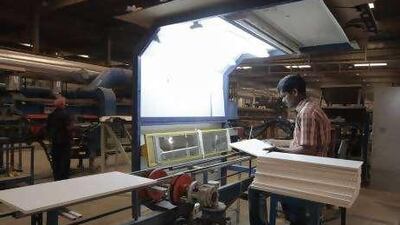RAK Ceramics avoided the worst ravages of the economic downturn as the company looked overseas to increase sales and source its raw materials. Global demand for RAK Ceramics products - tiles, sanitary fixtures and tableware - helped to push revenue up by 16.7 per cent to Dh3.77 billion (US$1.02bn) last year from Dh3.23bn in 2008. The company's net income grew to Dh262 million last year, a 20.1 per cent increase from Dh218m the previous year.
"The local market was slightly affected but it was compensated by more demand from other places," said Rajesh Patil, the company's assistant marketing manager. Analysts say the company has been so far unscathed in the downturn because of a huge production backlog. "The reason RAK Ceramics was not hurt with the recession is because they had sufficient backlog orders that they had already received cash in advance," said Hettish Kumar, a financial analyst for Global Investment House in Kuwait.
"The backlogs were up to the second quarter of 2010. After the second quarter, then we will see how it goes. It might be good or things may change." Through its worldwide production and distribution facilities, RAK Ceramics has managed to expand its reach globally as well as to source raw materials and talent. "Right now, 74 per cent of our products are exported to more than 150 countries," Mr Patil said.
"On the other hand, we are currently importing most of our raw materials from abroad, mostly from Spain. We also get some designs for custom, on-demand tiles from outside, especially from Italy." Increased imports of raw materials reduce the company's dependence on Ras al Khaimah's clay deposits, which in turn lessens the domestic environmental impact of its tile production without affecting output volumes. RAK Ceramics started production in 1991 with a capacity of 5,000 square metres of tiles a day. It's capacity is now 360,000 sq metres a day. The Ras al Khaimah operation accounts for 63 per cent of the company's output, with the remaining 37 per cent contributed by plants in Bangladesh, China, India, Iran and Sudan.
Establishing an international production network has been a key factor in the company's success and its rapid growth. "They have been able to reduce risks and overheads by establishing production plants closer to customers to reduce logistics cost, and going to places like Bangladesh, India and China, where labour costs are very low," Mr Kumar said. Last month, RAK Ceramics was listed on the Dhaka and Chittagong stock exchanges through its Bangladeshi subsidiary. The company's initial public offering (IPO) in Bangladesh yielded $258.6m, a record for the country. RAK Ceramics supplies 75 per cent of the sanitary fixtures and 25 per cent of the ceramic tiles used in Bangladesh.
In another milestone achievement, Ceramic World Review, a leading industry publication, recognised the company this week as the world's largest tile manufacturer. This came after the company dominated global tile production with output of 115 million sq metres last year. @Email:business@thenational.ae

